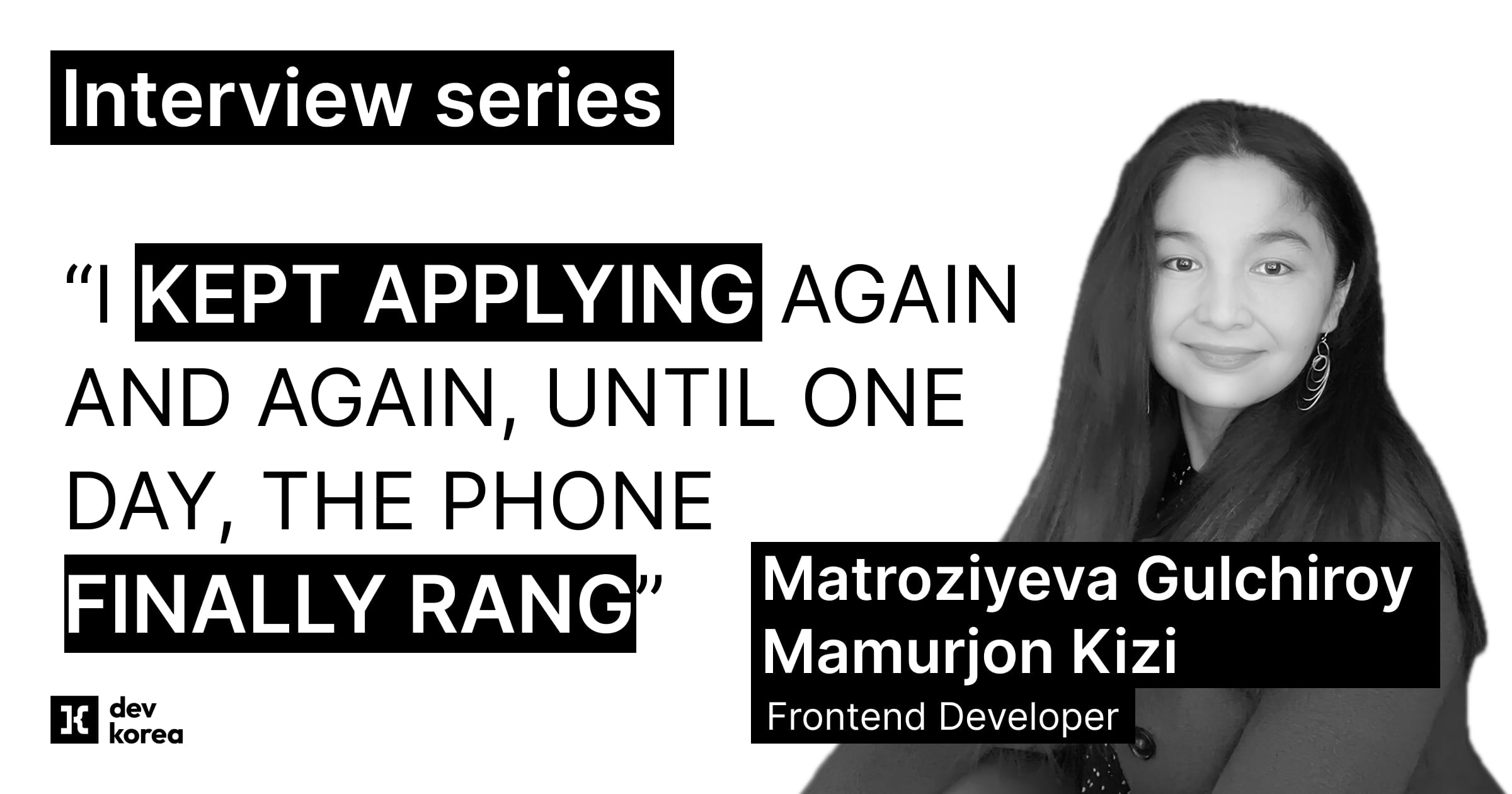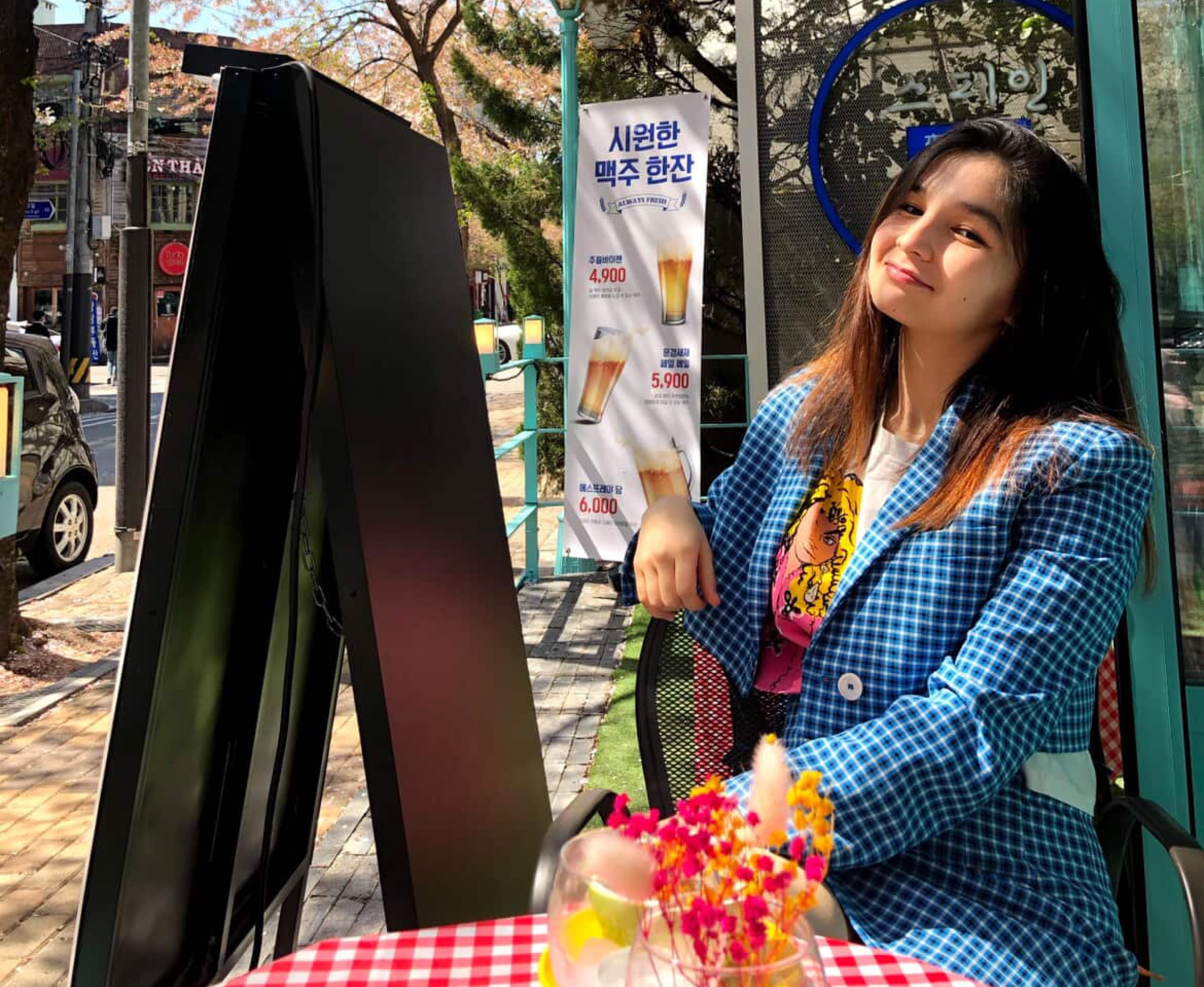
From crafting fashion to writing software: Guli's journey into Korea's tech industry
Meet Matroziyeva Gulchiroy Mamurjon Kizi — or simply Guli, an Uzbek Front-End Developer in Seoul. We sat down with her to talk about her journey from Namangan to Korea, how she built her career in tech, and why she believes more global talent should take a chance on Korea's growing tech scene.
Profile snapshot
- Name: Matroziyeva Gulchiroy Mamurjon Kizi
- Nationality: Uzbek
- Current role: Front-End Developer
- Years in Korea: 9 years
- Visa status: F2
- Languages spoken: Uzbek, English, Korean
- Previous countries worked in (if any): None
Background & career
Q. Can you briefly introduce yourself and your current role?
Hi, I'm Gulchiroy, but most people call me Guli.
I'm a software developer, and I like to think of myself as a proud one.
My background covers full-stack and even a bit of iOS development, but these days I'm mainly focused on front-end engineering. I currently work at a fully Korean-speaking company, which has been both a challenge and a blessing. Navigating cultural and language differences has pushed me to grow, not just as a developer but also as a communicator and problem-solver. At this point, I sometimes joke that I'm almost Korean!
I've lived in Korea for about nine years and graduated from Sejong University in Seoul, the place that gave me my start in tech. Since then, I've worked on everything from complex dashboards to performance-heavy UI systems.
But there's more to me than just code. I love talking to people, sharing ideas, and exploring the world — whether it's hiking through mountains, traveling to new cities, or brainstorming projects that might never get built (but still spark my imagination).
For me, development isn't just about software — it's about connecting ideas, cultures, and people, and finding beauty in how small lines of code can create something meaningful in this big, unpredictable world.
Q. What was your career path before moving to Korea?
It's a long story! (laughs)
Before 2016, I got into fashion design. It started as a small hobby — sketching, sewing, experimenting with fabrics — but soon my neighbors began asking me to make clothes for them. Suddenly, I had real customers trusting me with their outfits. For about three years, I designed and sewed everything by hand. It was rewarding to see people wear something I made, but it was also stressful. Everyone had different tastes and expectations, and trying to make them all happy often left me anxious and exhausted. Still, that time taught me so much patience, precision, and how small details can completely change how something feels.
Q. What inspired you to work in Korea?
I came to Korea to study Computer Science and Engineering at Sejong University. When graduation came closer, I asked myself:
Have I really experienced everything I came here for — to learn, to grow, to prove myself?
The honest answer was not yet.
I didn't want to return home with just a diploma; I wanted to become a professional who had tested herself in the real world. So I stayed. I was curious about Korean work culture, how teams operated, and what “speed and precision” truly meant here.
And secretly, I had a small dream — to work in one of those tall, glass-walled buildings I used to pass by on my way to class.
Now, that dream quietly came true.
Experience working in Korea
Q. How did you find your current job? Was the hiring process challenging as a foreigner?
I found my job through Saramin, one of Korea's major job platforms.
Finding a job as a foreigner in Korea isn't easy — especially if you don't speak the language. But even though I do, it still comes with challenges. Sometimes, hiring managers can't quite believe that a foreign applicant truly speaks Korean fluently, or they hesitate simply because of nationality. Many also worry about the visa process; they're unsure how it works and prefer to hire local candidates to avoid the extra paperwork. Because of that, many of my applications were declined even when my background and skills perfectly matched the job description.
Still, I kept applying again and again — until one day, the phone finally rang.
Q. How does Korean work culture compare to your home country's?
Oh, that's a big one! (laughs)
In Uzbekistan, life moves at a softer rhythm. Being five minutes late isn't the end of the world. But in Korea, even three minutes late can feel like a scandal. Punctuality equals respect.
The hierarchy is another difference. In Korea, you listen first, speak later. Age and title shape the flow of conversation. Back home, communication feels warmer and more personal, and we mix humor with formality.
And then, of course, after-work gatherings. In Korea, company dinners and drinks are seen as part of team bonding. In Uzbekistan, socializing is more casual; you can skip without guilt.
Korea taught me precision, responsibility, and discipline. Uzbekistan keeps me simply human.
Q. Do you speak Korean at work? How is communication handled in your team?
Yes, almost everything at work happens in Korean.
Meetings, messages, documentation — even the jokes in our group chat — all in Korean. At first, it was tough. Tech terms are one thing, but office humor and subtle expressions? That's another level. (laughs)
Q. What challenges have you faced adapting to Korea's work environment?
When I first started, I could understand Korean — but professional Korean? That was a new world. I used to write down every new phrase I heard and tape it to my desk. Those sticky notes became my mini Korean dictionary — and also proof that I was trying.
It took patience, but now, communication feels natural. Those notes turned into habits — and those habits built my confidence.
Lifestyle & community
Q. What's your life outside of work like? How have you built your social life here?
It's quite full! Thanks to meetup apps and travel groups, it's easy to connect with people who share similar interests. I love hiking, exploring new cities, and attending tech meetups.

Some of my close friends have moved away, but we still keep in touch — distance doesn't erase real connections.
Q. How much has knowing Korean (or learning it) helped in your daily life?
A lot.
Back in university, I told myself:
either be an A+ student or learn Korean
At first, I learned it for fun — but it soon became the bridge to everything.
When I started applying for jobs and sent my résumé in Korean, I finally got interview calls. Companies appreciated the effort.
Reflections & advice
Q. Do you plan to stay in Korea long-term, and how do you see your career evolving here?
Honestly, I don't have a fixed "expiry date" for Korea.
So for now, I'd say: I can see myself staying at least another five years — after that, it's "to be decided". I love the idea of eventually working as a freelancer, keeping a stable income while traveling and building something of my own. The good thing about being in tech is that our work doesn't have to be tied to one location.
As for my career, Korea is actually a good place to keep evolving.
The tech scene here is fast, competitive, and very product-focused from e-commerce and fintech to AI and startups. It pushes you to actually ship, not just talk about "ideas". Staying longer, I see myself growing from "just a developer" into someone who can lead projects, design better systems, and eventually build a product or company that can live both in Korea and beyond.
And the fun part for English speakers (including me): we write the code in english, that's a nice combo in a market that's opening more to global talent. That's also why my next step will probably be a more English-friendly environment. I miss speaking in full sentences without mixing three languages in one stand-up.
Q. What tips would you give to someone searching for a tech job in Korea?
Learn the language. That's the key.
And then just keep coding, keep learning, and surround yourself with people who inspire you. That's really it. Simple, but powerful.
Q. What can Korean companies do to better support and integrate international employees?
Korea is facing a declining population, so attracting international talent isn't just a choice — it's the future. Programs like KIIP (Korean Immigration and Integration Program) are great starts, but companies can go further.
Offer English communication training for local staff, and encourage foreigners to learn Korean deeply. Integration works both ways.
And importantly, create safer spaces for conversations about diversity and race. Many foreigners still stay silent when they face bias — not because they're weak, but because they don't feel heard.
At the end of the day, it all comes down to one rule:
Be kind.
Kindness builds trust faster than any policy — and that's where true inclusion begins.
Q. What's one thing you wish you knew before moving here?
Well, I came to Korea when I was 19, thinking that speaking English and getting into a Computer Science program would be enough. I had no idea what CS actually was. I still remember the first class where everyone had Visual Studio open and was printing "Hello World", and I didn't even know what a console was. Because I didn't understand what I was getting into, I lost my scholarship once and had to decide very seriously whether to quit or fight through it.
That's when I realized I needed to learn how computers "think", and for me, math became the key that suddenly made programming, compilers, loops, and problem-solving make sense. I also wish I had learned basic Korean before coming; as a student it was hard to find part-time jobs and support myself without it.
Finally, I wish I had started applying for jobs earlier instead of waiting for the "perfect" portfolio or timing. I was more ready than I believed, but I didn't have the right community or support system, so I doubted myself and delayed. If I could start again, I'd study what I'm choosing more deeply, learn Korean sooner, find a supportive tech community, and never let other people's doubts define my potential.
Q. Would you recommend Korea to other international tech professionals, and why?
Of course! I definitely would.
But I'll add one condition: learn at least basic Korean. It makes daily life smoother and shows respect for the culture, which will open many doors.
If you asked me ten years ago, I might have hesitated. But today, Korea is much more international — new communities are forming, workplaces are diversifying, and it's one of the safest countries in the world.
Rapid fire
- Favorite Korean food: Definitely 닭갈비 (Dakgalbi, meaning “marinated chicken stir-fried with vegetables”) — with extra cheese on top
- One must-visit place in Korea: 제주도 (Jeju-do) — Jeju Island, for sure
- Most surprising thing about Korean tech culture: Even with a fever, the deadline still wins. (laughs)
- Favorite Korean word or phrase: 징글징글하다 (jinggeuljinggeulhada) → It's hard to translate, but it basically means "I'm so done with this" or "This is driving me crazy".
Connect with Guli
- LinkedIn: /in/gulchiroy-matroziyeva-b42420175
If you want to be next and contribute, send us an email at florian@dev-korea.com.
Ready to explore your next move? Visit Dev Korea to check the latest job openings, or if you're an employer, post a job and connect with our vibrant community of tech talent eager to contribute to Korea's innovation ecosystem.